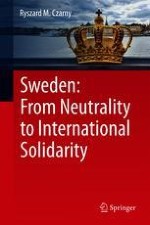2018 | OriginalPaper | Buchkapitel
18. Activities for International Peace and Security
verfasst von : Ryszard M. Czarny
Erschienen in: Sweden: From Neutrality to International Solidarity
Aktivieren Sie unsere intelligente Suche, um passende Fachinhalte oder Patente zu finden.
Wählen Sie Textabschnitte aus um mit Künstlicher Intelligenz passenden Patente zu finden. powered by
Markieren Sie Textabschnitte, um KI-gestützt weitere passende Inhalte zu finden. powered by
